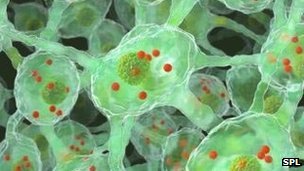
Parkinson’s disease news for Dubai
By Michelle Roberts Health reporter, BBC News
Scientists in the US have successfully made human brain cells in the lab that are an exact replica of genetically caused Parkinson’s disease.
The breakthrough means they can now see exactly how mutations in the parkin gene cause the disease in an estimated one in 10 patients with Parkinson’s.
And it offers a realistic model to test new treatments on – a hurdle that has blighted research efforts until now.
The team told Nature Communications their work was a “game-changer”.
Lab-grown
“This is the first time that human dopamine neurons have ever been generated from Parkinson’s disease patients with parkin mutations,” said Dr Jian Feng who led the investigations.
“Before this, we didn’t even think about being able to study the disease in human neurons.
“The brain is so fully integrated. It’s impossible to obtain live human neurons to study.”
Studying human neurons is critical in Parkinson’s disease since animal models that lack the parkin gene do not develop the condition, rendering them useless for this research purpose.
To make the human neurons the scientists used a technique already successfully tested by others which can turn donated skin cells into brain tissue.
They used skin samples from four volunteers – two healthy people and two with Parkinson’s disease caused by a parkin gene mutation.
This allowed them to observe the parkin gene at work.
Normally, parkin controls the production of an enzyme called MAO (monamine oxidase) which, in turn, keeps a check on the brain-signalling chemical dopamine.
When parkin is mutated, that regulation is lost and levels of MAO increase, which can be toxic to dopamine-producing brain cells.
The scientists now want to test new treatments that might prevent this damage occurring and stop this form of Parkinson’s.
They have already shown that they can reverse the defect by putting a normal parkin gene into diseased neurons.
Dr Michelle Gardner, research development manager at Parkinson’s UK, said the study was particularly exciting because it provided a new way to investigate this genetic form of Parkinson’s.
“Parkinson’s UK funded research has already shown that parkin plays a key role in how Parkinson’s develops in the brain nerve cells that die.”
More information about Parkinson’s Disease

